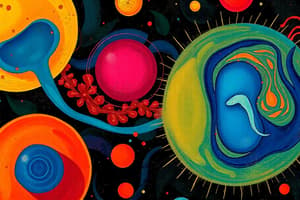Podcast
Questions and Answers
During which phase of the menstrual cycle does ovulation occur?
During which phase of the menstrual cycle does ovulation occur?
- Ovulation phase (correct)
- Luteal phase
- Follicular phase
- Menstruation phase
Where does fertilization usually take place in the female reproductive system?
Where does fertilization usually take place in the female reproductive system?
- Fallopian tube (correct)
- Ovary
- Vagina
- Uterus
Which event marks the beginning of pregnancy?
Which event marks the beginning of pregnancy?
- Travel of the zygote to the fallopian tube
- Implantation of the zygote (correct)
- Fertilization in the uterus
- Release of a mature egg
What is the main hormone produced during the luteal phase of the menstrual cycle?
What is the main hormone produced during the luteal phase of the menstrual cycle?
What is the result of successful fertilization?
What is the result of successful fertilization?
Which property states that the sum of the interior angles of a triangle is 180 degrees?
Which property states that the sum of the interior angles of a triangle is 180 degrees?
What type of triangle has two sides that are equal?
What type of triangle has two sides that are equal?
In a right triangle, which side is equal to the sum of the squares of the other two sides?
In a right triangle, which side is equal to the sum of the squares of the other two sides?
What type of triangle has all sides equal and all angles measuring 60 degrees?
What type of triangle has all sides equal and all angles measuring 60 degrees?
What does the centroid of a triangle represent?
What does the centroid of a triangle represent?
What is the formula for calculating the area of a triangle using the base and height?
What is the formula for calculating the area of a triangle using the base and height?
How is the area of a right triangle usually calculated?
How is the area of a right triangle usually calculated?
Which theorem can be used to find the area of a right triangle?
Which theorem can be used to find the area of a right triangle?
What do we call two triangles that have the same shape and size?
What do we call two triangles that have the same shape and size?
How can we prove that two triangles are congruent?
How can we prove that two triangles are congruent?
Flashcards are hidden until you start studying
Study Notes
Human Reproduction
Human reproduction is a fascinating process that brings together two individuals to create a new life. It's a marvel of biology that involves the male and female reproductive systems working in harmony. Let's dive into the intricacies of these systems and the processes of menstrual cycle, pregnancy, and fertilization that make this remarkable journey possible.
Male Reproductive System
The male reproductive system primarily consists of the testes, which produce sperm and testosterone, the scrotum, which provides an optimal temperature for sperm production, the vas deferens, which transport sperm, and the penis, which facilitates ejaculation. The process of sperm production takes place in the testes, where immature sperm cells, known as spermatogonia, undergo a series of cell divisions and differentiation to become mature sperm cells, or spermatozoa, which contain half the chromosomes of a normal human cell.
Female Reproductive System
The female reproductive system includes the ovaries, which produce eggs and hormones, the fallopian tubes, which transport eggs, the uterus, which provides a nurturing environment for a growing embryo, and the vagina, which serves as the birth canal and internal receptacle for sperm and sexual intercourse.
The menstrual cycle is a monthly event beginning with the shedding of the uterine lining (endometrium) and ending with the possible release of an egg (ovulation). Ovarian follicles containing immature eggs develop and mature during this cycle under the influence of hormones produced by the ovaries and the pituitary gland.
Menstrual Cycle
The menstrual cycle can be divided into four main phases:
- Menstruation: The shedding of the uterine lining due to the decrease in progesterone levels.
- Follicular phase: The development of an ovarian follicle containing an egg.
- Ovulation: The release of a mature egg.
- Luteal phase: The production of progesterone by the corpus luteum and the preparation of the uterine lining for potential implantation.
Pregnancy
Pregnancy occurs when a sperm fertilizes an egg within the fallopian tube. The fertilized egg, now called a zygote, travels down the fallopian tube to the uterus where it implants in the uterine lining. Pregnancy is then divided into three trimesters, each lasting approximately three months. Each trimester is marked by significant changes in the developing fetus and the mother's body, leading to the birth of a healthy baby.
Fertilization
Fertilization is the process by which a sperm cell penetrates and fuses with the egg. The process involves several stages, including capacitation, acrosome reaction, and the fusion of the sperm and egg membranes. Fertilization results in the formation of a zygote, which contains the genetic material of both the egg and sperm.
Fertilization is a delicate and precise process that, when successful, leads to the development of a new life. The human reproductive system is a fascinating and complex system that involves a sequence of events to allow for the creation of a new individual. Understanding the intricacies of this system can help us appreciate the wonder of life and the processes that make it possible.
Studying That Suits You
Use AI to generate personalized quizzes and flashcards to suit your learning preferences.




